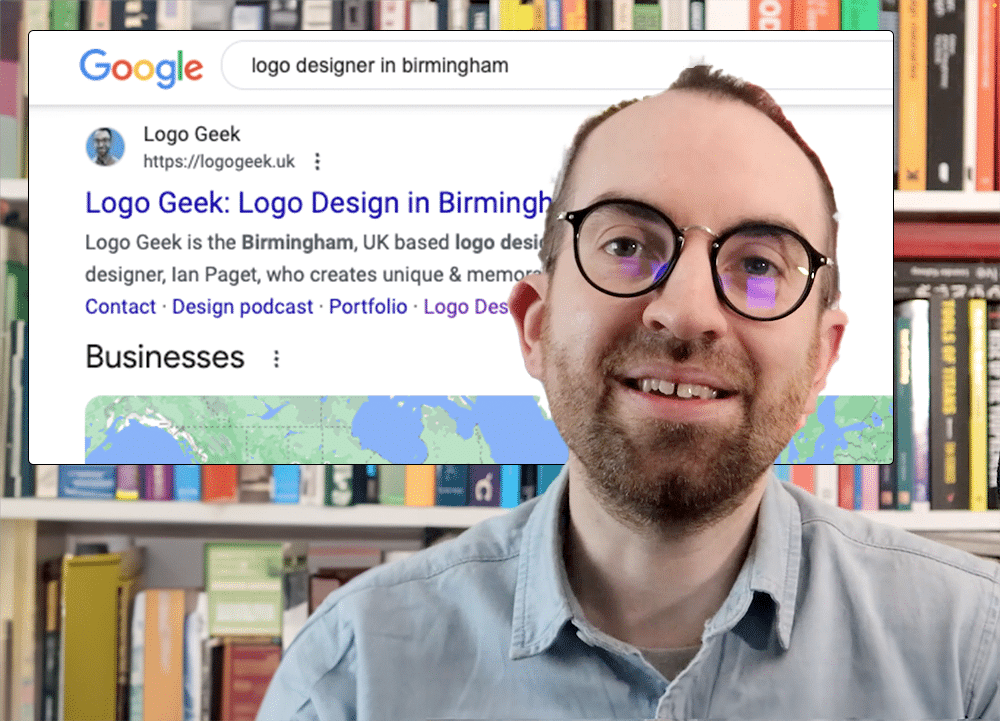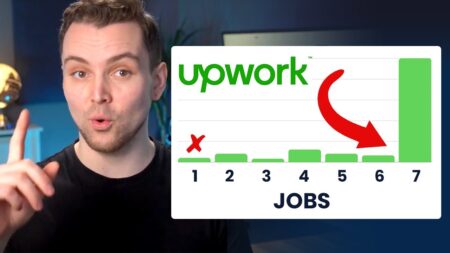As a freelance logo designer based in Birmingham, I know firsthand how crucial it is to be easily discoverable by potential clients. One of the most effective ways to achieve this is through search engine optimization (SEO), particularly when it comes to local search.
Over the years, I’ve implemented various SEO strategies that have helped my website rank highly for search terms like “logo designer Birmingham” and “logo design UK.” These efforts have been instrumental in attracting a steady stream of qualified leads and growing my business.
In this article, I’ll be sharing 10 actionable steps that freelancers can take to optimize their websites for local search. From defining your primary keywords to creating location-specific content and building relevant backlinks, these proven tactics will help you improve your online visibility and attract more clients in your area.
Whether you’re a graphic designer, web developer, or any other type of freelancer, these SEO tips will be invaluable in helping you stand out from the competition and build a thriving business. So, let’s dive in and explore how you can harness the power of local search to take your freelance career to the next level!
NOTE: This article is an adaptation of a video presentation given by Ian Paget for our members-only video library at SolidGigs.com.
Step 1: Define Your Service and Location
The first step in optimizing your website for local search is to clearly define your service and location. As a freelancer, you likely offer a specific set of skills or services, such as logo design, web development, or content writing. Identify the primary service you want to be known for and combine it with your location to create a targeted keyword phrase.
For example, as a logo designer based in Birmingham, my primary keyword is “logo design Birmingham.” This phrase encapsulates both what I do and where I do it, making it easier for potential clients in my area to find me through search engines.
And guess what, I rank very well for this term and related terms too:
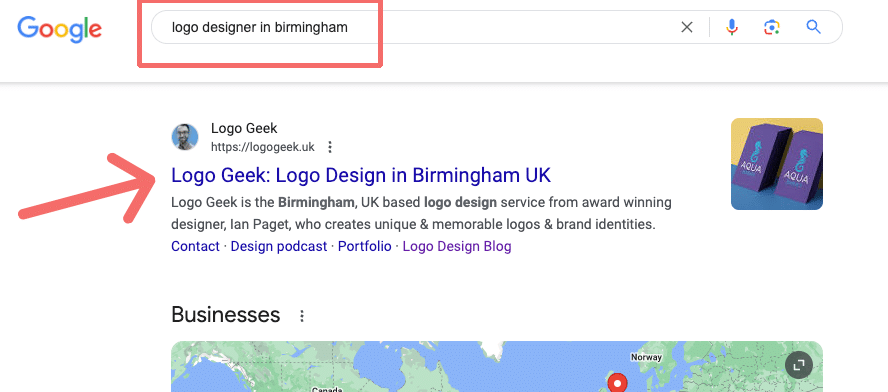
Targeting local searches is crucial because many people include location-based terms when searching for services online. They might search for “freelance graphic designer London” or “SEO consultant Birmingham,” expecting to find professionals in their area who can meet their needs.
By incorporating your location into your primary keyword, you signal to search engines that your business is relevant to users in that specific area. This increases your chances of appearing in local search results and attracting clients who are more likely to work with you due to your proximity and local knowledge.
Implementing effective SEO strategies can be complemented by the ability to scrape data from Google search, revealing keyword trends and competition levels. This not only aids in defining optimal keywords but also enhances content analysis. Utilizing tools like Lobstr’s Google Search Scraper ensures prompt access to valuable insights for refining your local SEO efforts.
Step 2: Optimize Your Homepage
Once you’ve defined your primary keyword, it’s time to optimize your website’s homepage. Start by including your keyword in the H1 title tag, which is the main heading on your page. For instance, if your primary keyword is “logo design Birmingham,” your H1 could be “Professional Logo Design Services in Birmingham” or “Birmingham’s Premier Logo Designer.”
It’s essential to have only one H1 tag per page, as multiple H1s can confuse search engines and dilute the relevance of your content. Make sure to incorporate your primary keyword naturally within the body of your homepage content as well. This helps search engines understand the context and purpose of your page.

In addition to optimizing your on-page content, be sure to include your address and phone number in the footer or on a dedicated contact page. This information helps search engines verify your location and can improve your local search rankings. It also makes it easy for potential clients to get in touch with you.
If you work from home and prefer not to list your home address, consider using a virtual office address or renting a mailbox at a local business center. This allows you to maintain privacy while still providing a legitimate business address for your website and online profiles.
On-page content optimization also includes checking your text for originality. Search engines don’t rank (or even ban) pages with duplicated content, so write yours from scratch and scan it through a reputable plagiarism check before publishing.
By optimizing your homepage with your primary keyword, ensuring a clear H1 tag, and including your contact information, you lay the foundation for a strong local SEO presence.
Step 3: Utilize Metadata
Metadata is another crucial component of SEO that freelancers should leverage to improve their local search rankings. Metadata refers to the information that appears in the HTML code of your website, providing search engines with key details about your content.
The two most important types of metadata for local SEO are the meta title and meta description. Your meta title should include your primary keyword and briefly describe the main focus of your page. For example, a meta title for a freelance logo designer in Birmingham could be “Logo Design Birmingham | Professional Branding Services.”

The meta description is a short summary of your page’s content, typically appearing beneath the title in search engine results pages (SERPs). This is your chance to entice potential clients to click through to your site. Include your primary keyword and a compelling description of your services, such as “Experienced logo designer based in Birmingham, delivering custom branding solutions for businesses of all sizes. Get in touch for a free consultation.”

By crafting effective meta titles and descriptions that incorporate your service and location, you help search engines better understand the relevance of your website to local searches. This, in turn, improves your chances of ranking higher in local search results and attracting more targeted traffic to your site.
Step 4: Implement Schema Markup
Schema markup is a powerful tool for enhancing your website’s local SEO. It is a form of structured data that helps search engines better understand the content and context of your web pages. By implementing schema markup, you can provide search engines with explicit information about your business, such as your address, phone number, and the services you offer.
To leverage schema markup for local SEO, add your business address and phone number to your website’s code using the appropriate schema tags. This helps search engines display your contact information directly in search results, making it easier for potential clients to find and contact you.
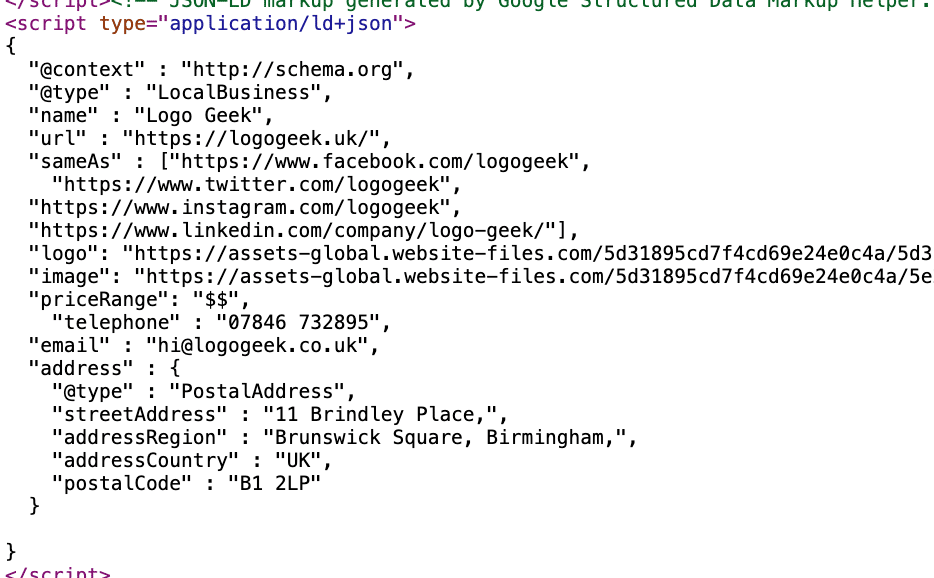
Implementing schema markup offers several benefits for local SEO. First, it increases your chances of appearing in rich snippets, which are enhanced search results that include additional information like ratings, reviews, and business hours. Rich snippets can improve your click-through rates and drive more targeted traffic to your website.
Moreover, schema markup helps search engines verify the accuracy and consistency of your business information across the web. This is crucial for building trust and credibility with both search engines and potential clients, ultimately boosting your local search rankings.
Step 5: Create Quality Content
Creating high-quality, informative content is essential for attracting potential clients and establishing your expertise in your field. As a freelancer, focus on writing content that showcases your skills, experience, and the unique value you bring to your clients.
Start by developing a content strategy that revolves around your primary service and target location. For example, if you’re a logo designer in Birmingham, create blog posts, case studies, and portfolio pieces that highlight your logo design process, successful projects, and the impact your work has had on your clients’ businesses.
When structuring your content, use a clear hierarchy of headings (H1, H2, H3) and well-organized paragraphs. This not only makes your content more readable and engaging for visitors but also helps search engines understand the main topics and themes of your pages.
Throughout your content, incorporate relevant keywords that are associated with your primary service and location. For a logo designer, related keywords might include “brand identity,” “visual branding,” “logo concepts,” “design process,” and “Birmingham graphic designer” — all of which you can identify by using the right tools or a combination of them, such as Google Trends or a Google Trends alternative for deeper insights. Use these keywords naturally within your headings, paragraphs, and image alt tags to reinforce your relevance to local search queries.
Here are a few examples of how you might use related keywords in your content:
- “As a Birmingham graphic designer specializing in logo design, I help businesses create strong brand identities that resonate with their target audiences.”
- “My logo design process involves extensive research, conceptualization, and refinement to ensure that each client receives a unique and memorable visual branding solution.”
- “From startups to established companies, I’ve had the privilege of working with a diverse range of Birmingham businesses to elevate their brand presence through strategic logo design.”
By creating valuable, keyword-rich content that demonstrates your expertise and commitment to your craft, you’ll not only improve your local search rankings but also build trust and credibility with potential clients.
Step 6: Optimize Images
Optimizing the images on your website is another critical aspect of local SEO. Search engines cannot “read” images in the same way they process text, so it’s essential to provide context and relevance through image file names, alt tags, and captions.

When adding images to your website, choose high-quality, relevant visuals that complement your content and showcase your work. For example, include portfolio pieces, case study images, or photos of yourself working in your studio or meeting with clients.
As you save and upload your images, use descriptive file names that incorporate your primary keyword and related terms. For instance, “Birmingham-logo-designer-client-meeting.jpg” or “logo-design-process-sketches.png.” This helps search engines understand the subject matter of your images and their relevance to your content.
Next, add alt text to each image, providing a concise description that includes your keywords. Alt text is displayed when an image fails to load and is used by screen readers to assist visually impaired users. An example of effective alt text might be, “Logo designer in Birmingham reviewing client branding concepts.”
By optimizing your images with keyword-rich file names and alt text, you enhance your website’s overall SEO and make it easier for search engines to associate your visual content with your target service and location. This, in turn, can improve your local search rankings and drive more relevant traffic to your site.
Step 7: Create Service-Specific Landing Pages
If you offer multiple services as a freelancer, creating dedicated landing pages for each service can significantly boost your local SEO efforts. By developing service-specific pages, you can target a wider range of keywords and provide more focused, relevant content for potential clients.
For example, if you’re a graphic designer offering logo design, branding, and print design services, create separate landing pages for each of these offerings. This allows you to optimize each page for specific keywords, such as “logo design Birmingham,” “branding services in Birmingham,” and “print design Birmingham.”
When creating your service-specific landing pages, follow the optimization steps outlined earlier, including:
- Incorporating your target keyword in the H1 tag and throughout the content
- Optimizing your meta title and description
- Implementing schema markup
- Crafting high-quality, informative content
- Optimizing images with relevant file names and alt text
By providing in-depth information about each service and showcasing relevant case studies or portfolio pieces, you demonstrate your expertise and make it easier for potential clients to find the specific services they need. This targeted approach can lead to higher conversions and more qualified leads for your freelance business.
Step 8: Set Up Google My Business
Setting up a Google My Business (GMB) listing is crucial for freelancers looking to improve their local SEO. GMB is a free tool that allows businesses to manage their online presence across Google, including search results and Google Maps.
To create your GMB listing, visit the Google My Business website and follow the prompts to set up your profile. Provide accurate and comprehensive information about your freelance business, including your business name, address, phone number, website URL, and services offered.
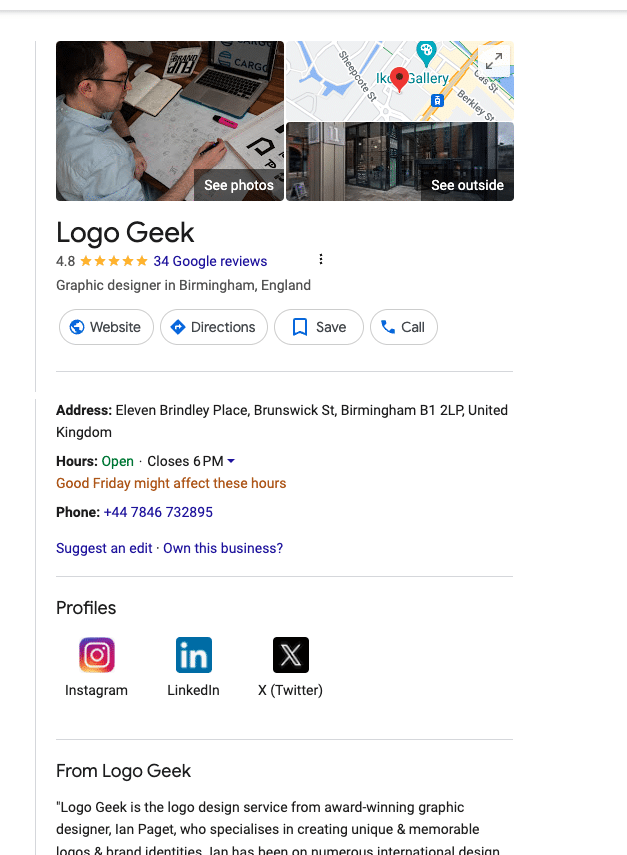
Ensure that your business information is consistent across your website and GMB listing. This means using the same address, phone number, and business name throughout. Consistency helps build trust with search engines and makes it easier for potential clients to find and contact you.
Once your GMB listing is set up, encourage satisfied clients to leave reviews on your profile. Positive reviews can improve your visibility in local search results and provide social proof for potential clients considering your services.
Regularly update your GMB listing with fresh content, such as photos of your work, blog posts, or special offers. This shows search engines that your business is active and engaging, which can further boost your local SEO efforts.
Step 9: Build Relevant Backlinks (300 words)
Building relevant backlinks is an essential component of any successful SEO strategy. Backlinks are links from other websites that point to your site, acting as a “vote of confidence” in the eyes of search engines. The more high-quality, relevant backlinks you have, the higher your website is likely to rank in search results.
To consistently acquire high-quality backlinks, many businesses turn to an SEO agency or a monthly link building service, which ensures a steady stream of relevant and authoritative links over time. The more high-quality, relevant backlinks you have, the higher your website is likely to rank in search results.
For freelancers targeting local SEO, it’s crucial to focus on building backlinks from websites and online directories that are relevant to your industry and location. Here are some strategies to help you build valuable backlinks:
- Create valuable content: Develop blog posts, infographics, or resources that provide genuine value to your target audience. When you create content that is informative, engaging, and shareable, other websites are more likely to link back to it naturally.
- Contribute guest blog posts: Reach out to popular blogs or websites in your industry and offer to write a guest post. By providing high-quality content for their site, you can often secure a backlink to your own website in your author bio or within the post itself.
- Get interviewed on industry podcasts: Seek out podcasts that cater to your target audience and offer to share your expertise as a guest. Most podcasts include show notes with links to their guests’ websites, providing a valuable backlink opportunity.
- Add your business to online directories: Submit your freelance business to reputable online directories, such as Yelp, YellowPages, or industry-specific directories. These listings often include a link back to your website, helping to boost your local SEO.
- Engage in local community events: Participate in local events, sponsor community initiatives, or collaborate with other local businesses. These activities can lead to mentions of your business on event websites or local news outlets, often with a link back to your site.
When building backlinks, prioritize quality over quantity. A few high-quality, relevant backlinks from reputable sources are far more valuable than a large number of low-quality or irrelevant links. Focus on building relationships and creating content that naturally attracts backlinks, and your local SEO efforts will benefit greatly.
Step 10: Keep Your Website Fresh
Regularly updating your website with fresh, relevant content is crucial for maintaining and improving your local SEO rankings. Search engines favor websites that consistently provide value to their users, and one of the best ways to demonstrate this is by adding new content on a regular basis.
As a freelancer, consider adding blog posts, case studies, or project updates to your website. Blog posts can cover topics related to your services, industry trends, or helpful tips for your target audience. Case studies showcase your expertise and the results you’ve achieved for your clients, while project updates keep your portfolio current and highlight your latest work.
Sometimes, you may also need to write content on similar topics again and again. However, you may run out of ideas while doing so and end up self-plagiarizing your work. A better way to keep your website updated with fresh content is by crafting multiple copies from a single draft written on a particular topic.
Paraphrasing is the way to go.
However, doing it manually may lead to mistakes and duplication. A cutting-edge paraphrasing tool will do the trick. It will use AI and NLP to ensure impeccable paraphrases to help you get multiple plagiarism-free copies from a single draft.
By continually adding new content to your site, you give search engines more pages to index and more opportunities to rank for relevant keywords. Fresh content also keeps your website visitors engaged and encourages them to return for more insights and updates.
Moreover, regularly updating your website shows search engines that your site is active and relevant. This can lead to more frequent crawling and indexing of your pages, which can positively impact your search rankings over time.
Remember, the key to successful content creation is quality and consistency. Focus on providing value to your target audience, and make a commitment to updating your website on a regular schedule, whether that’s weekly, bi-weekly, or monthly.
What’s Next?
In today’s competitive digital landscape, SEO is essential for freelancers looking to attract more clients and grow their businesses. By optimizing your website for local search, you can improve your visibility, build trust with potential clients, and ultimately land more projects in your area of expertise.
The 10 actionable steps outlined in this article provide a roadmap for freelancers to enhance their local SEO efforts. From defining your primary keyword and optimizing your homepage to creating quality content and building relevant backlinks, each step plays a crucial role in improving your search rankings and driving targeted traffic to your site.
Implementing these strategies may take time and effort, but the results are well worth the investment. Remember, SEO is an ongoing process, and consistency is key. Make a commitment to regularly updating your website, creating valuable content, and engaging with your target audience both online and in your local community.
Keep the conversation going...
Over 10,000 of us are having daily conversations over in our free Facebook group and we'd love to see you there. Join us!
